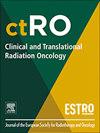头颈癌放疗患者的决策后悔
IF 2.7
3区 医学
Q3 ONCOLOGY
引用次数: 0
摘要
目的头颈癌患者经常面临在肿瘤预后相似的治疗方案之间做出选择。在这种情况下,决策后悔成为一个中心问题,特别是在共同决策的框架内。本研究旨在评估头颈癌患者决策后悔的患病率,并确定相关的危险因素。方法本横断面观察研究纳入了接受治疗性放疗的头颈癌患者。采用决策后悔量表(DRS)评估决策后悔。其他患者报告的结果包括健康相关生活质量(HRQoL)、心理困扰、焦虑、抑郁和对癌症进展的恐惧(FoP)。结果在300例符合条件的患者中,192例参与并填写了DRS。中位年龄为59岁(IQR, 45-65),从放疗结束到参与研究的中位时间为45.5个月(IQR, 24-68.5)。放疗方面无决定后悔(0分)占27%,轻度后悔(1-25分)占34%,高后悔(>;25分)占39%。放疗、全身治疗和手术的DRS平均(SD)评分分别为23.6(22.4)、20.8(19.3)和20.9(22.2)。决策后悔与HRQoL相关(r = -0.34, p <;0.001),痛苦(r = 0.25, p <;0.001)、焦虑(r = 0.20, p <;0.01),抑郁(r = 0.19, p <;0.01), FoP (r = 0.29, p <;0.001)。在多元回归中,较差的ECOG状态(β = 0.18, p <;0.01), HRQoL较低(β = -0.22, p <;0.01),较高的FoP (β = 0.19, p <;0.05)与决策后悔相关。结论超过三分之一的头颈癌患者有较高的决策后悔。这些发现强调了加强共同决策以减轻头颈部肿瘤患者决策后悔的必要性。本文章由计算机程序翻译,如有差异,请以英文原文为准。
Decision regret in patients with head-and-neck cancer undergoing radiotherapy
Purpose
Head-and-neck cancer patients often face decisions between treatment options with similar oncological outcomes. In this context, decision regret becomes a central concern, particularly within the framework of shared decision-making. This study aims to assess the prevalence of decision regret and identify associated risk factors among head-and-neck cancer patients.
Methods
This cross-sectional observational study included patients who underwent curative radiotherapy for head-and-neck cancer. Decision regret was assessed using the Decision Regret Scale (DRS). Additional patient-reported outcomes included health-related quality of life (HRQoL), psychological distress, anxiety, depression, and fear of cancer progression (FoP).
Results
Of 300 eligible patients, 192 participated and filled out the DRS. The median age was 59 years (IQR, 45–65), and the median time between the end of radiotherapy and study participation was 45.5 months (IQR, 24–68.5). No decision regret (0 points) in terms of radiotherapy was reported by 27 %, mild regret (1–25 points) by 34 %, and high regret (>25 points) by 39 %. The mean (SD) DRS score regarding radiotherapy, systemic treatment, and surgery was 23.6 (22.4), 20.8 (19.3), and 20.9 (22.2), respectively. Decision regret was associated with HRQoL (r = -0.34, p < 0.001), distress (r = 0.25, p < 0.001), anxiety (r = 0.20, p < 0.01), depression (r = 0.19, p < 0.01), and FoP (r = 0.29, p < 0.001). In the multiple regression, a poorer ECOG status (β = 0.18, p < 0.01), lower HRQoL (β = -0.22, p < 0.01), and higher FoP (β = 0.19, p < 0.05) were associated with decision regret.
Conclusions
More than one-third of head-and-neck cancer patients report high decision regret. These findings highlight the need for enhanced shared decision-making to mitigate decision regret in head-and-neck oncology.
求助全文
通过发布文献求助,成功后即可免费获取论文全文。
去求助
来源期刊

Clinical and Translational Radiation Oncology
Medicine-Radiology, Nuclear Medicine and Imaging
CiteScore
5.30
自引率
3.20%
发文量
114
审稿时长
40 days
 求助内容:
求助内容: 应助结果提醒方式:
应助结果提醒方式:


